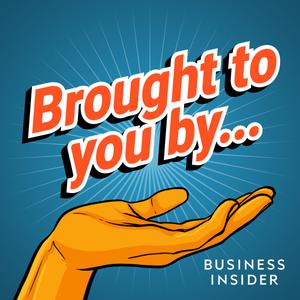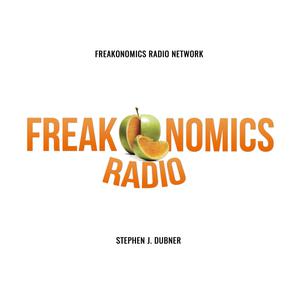
Brought to you by...
Business Insider
Surprising stories about how the biggest, household name brands affect our lives and culture — for better or worse. Host Charlie Herman finds tales of tragedy, love, strange histories, unintended consequences, and accidental success.More information at www.businessinsider.com/household-name
- 29 minutes 13 seconds62: This was Brought to you by...
For the last episode of our show, you told us stories about a first love, fitting in, family trips, and how brands played an unexpected role in all of it. Plus, the team who made Brought to you by… takes a minute to say goodbye. Thank you for listening.
See Privacy Policy at https://art19.com/privacy and California Privacy Notice at https://art19.com/privacy#do-not-sell-my-info.
9 December 2020, 8:00 am - 40 minutes 18 seconds61: Kellogg v. Kellogg
John Harvey Kellogg was a famous American physician. His brother Will was an ingenious businessman. Together, they invented flaked cereal and revolutionized American breakfast. But John Harvey and Will were bitter rivals, and they waged war over the very food that made them famous. So which Kellogg is the one whose name we remember today?
See Privacy Policy at https://art19.com/privacy and California Privacy Notice at https://art19.com/privacy#do-not-sell-my-info.
2 December 2020, 8:00 am - 32 minutes 42 seconds60: The Levi's That Came In From the Cold
At the start of the Cold War, Levi’s jeans represented everything communist governments were trying to stamp out. But Levi’s kept finding their way behind the Iron Curtain, especially into East Germany. There, people could see what they were missing just over the wall that separated them from the West. East German officials started to worry: Could a pair of pants bring down the government?
See Privacy Policy at https://art19.com/privacy and California Privacy Notice at https://art19.com/privacy#do-not-sell-my-info.
18 November 2020, 8:00 am - 40 minutes 45 seconds59: The Pepski Generation
In 1990, PepsiCo made a deal with the Soviet Union for submarines, a cruiser, a frigate, and a destroyer. It was the largest agreement ever made between an American company and the USSR. But it wasn’t Pepsi’s first deal with the Soviets. For decades, one executive had been flying to the Soviet Union to meet foreign trade ministers, politicians, and regular Russians. At the height of the Cold War, he was determined to make a deal and bring two countries locked in a bitter conflict together.
See Privacy Policy at https://art19.com/privacy and California Privacy Notice at https://art19.com/privacy#do-not-sell-my-info.
11 November 2020, 8:00 am - 24 minutes 2 seconds58: The House That Sears Built
A few months ago, a listener in our Facebook group suggested we look into Sears mail-order homes for a potential episode. We loved the idea, and it turns out there’s already a fantastic story about these houses from the podcast 99% Invisible. Today, we’re sharing that episode with you.
99% Invisible is a show that explores all the thought that goes into the things around us that we never think about. Learn more about this episode and listen to more of their show here: https://99percentinvisible.org/episode/the-house-that-came-in-the-mail/
See Privacy Policy at https://art19.com/privacy and California Privacy Notice at https://art19.com/privacy#do-not-sell-my-info.
4 November 2020, 8:00 am - 35 minutes 24 seconds57: Bacardi and the Long Fight for Cuba
Since its founding nearly 160 years ago in Cuba, one family has run Bacardi. They fought for Cuba’s freedom, fostered an artistic community in the country, and rebuilt their business after fleeing the country because of Fidel Castro. Even today, they continue the struggle for Cuban identity from abroad. It’s the history of Cuba and what it means to be Cuban, distilled into a glass of Bacardi rum.
Thanks to Tom Gjelten for letting us use the title of his book, "Bacardi and the Long Fight for Cuba": https://www.penguinrandomhouse.com/books/296309/bacardi-and-the-long-fight-for-cuba-by-tom-gjelten/
See Privacy Policy at https://art19.com/privacy and California Privacy Notice at https://art19.com/privacy#do-not-sell-my-info.
28 October 2020, 7:00 am - 35 minutes 58 seconds56: Pan Am in Vietnam
During the Vietnam War, Pan Am flew troops in and out of an active war zone on rest and recuperation trips. The flight attendants on those planes didn’t get any special training or preparation to deal with some of the horrors they would witness, and when the war was over, they didn’t receive recognition from the U.S. government. But their role left a lasting impact, even if their contributions were largely forgotten.
See Privacy Policy at https://art19.com/privacy and California Privacy Notice at https://art19.com/privacy#do-not-sell-my-info.
21 October 2020, 7:00 am - 1 minute 12 secondsTrailer: The Final Season
On October 21, we’re back for a final season. With episodes that take us behind the Iron Curtain, 35,000 feet over the Vietnam War, and through two Cuban revolutions, we’ll hear brands ask the question: Is politics any of our business?
See Privacy Policy at https://art19.com/privacy and California Privacy Notice at https://art19.com/privacy#do-not-sell-my-info.
14 October 2020, 7:00 am - 6 minutes 41 secondsSend us your "Product Misplacement" stories!
We’re working on a special episode for next season and want to hear about how a household name brand played a pivotal role in your life. Maybe you and your dad took a wild road trip in the family Volkswagen on your way to be dropped off at college? Did you make the heart-wrenching call to sell your Topps baseball card collection to pay for your prom dress? We want to hear about how a brand made you feel grown up, or was part of a rite of passage. Call and leave a message at (646) 768-4777, or record a short voice memo and send it to [email protected] with "Product Misplacement" in the subject line. We may use it in the episode!
See Privacy Policy at https://art19.com/privacy and California Privacy Notice at https://art19.com/privacy#do-not-sell-my-info.
9 September 2020, 7:00 am - 37 minutes 29 seconds55: The Polaroid Revolutionary Workers Movement
When two employees at Polaroid discovered their company’s technology was being used by the South African government to help enforce apartheid, they protested and called for an international boycott of their employer until it withdrew from that country. It was one of the first anti-apartheid protests against a major U.S. corporation and the beginning of the broader divestment movement that followed. Polaroid’s leadership responded with steps it thought could help Black South Africans, and its efforts pose a question we still grapple with today: What responsibility do corporations have to promote social justice and human rights around the world?
For more on Polaroid, South Africa and the Polaroid Revolutionary Workers Movement: https://bit.ly/btyb-polaroid
Subscribe to Business Insider: read.bi/podcast
Sign up for our newsletter: http://newsletter.businessinsider.com/join/brought-to-you-by
See Privacy Policy at https://art19.com/privacy and California Privacy Notice at https://art19.com/privacy#do-not-sell-my-info.
12 August 2020, 7:00 am - 38 minutes 37 seconds54: Will The Real Mr. Oreo Please Stand Up?
This week, we’re teaming up with the podcast Proof from America’s Test Kitchen to bring you an Oreo story with three delicious parts. First, the longstanding rivalry between two biscuit makers that gave birth to the world’s favorite cookie. Then, one little girl’s brave choice (risking divine punishment!) to taste the famous creme filling. And finally, a full-scale investigation into who really invented that creme filling — and how one “Mr. Oreo” got all the glory.
Read Marjorie Ingall’s essay about the Oreo: https://www.tabletmag.com/sections/food/articles/unholy-wafer
Listen to more episodes of Proof: https://www.americastestkitchen.com/proof
Subscribe to Business Insider: read.bi/podcast
See Privacy Policy at https://art19.com/privacy and California Privacy Notice at https://art19.com/privacy#do-not-sell-my-info.
5 August 2020, 7:00 am - More Episodes? Get the App
Your feedback is valuable to us. Should you encounter any bugs, glitches, lack of functionality or other problems, please email us on [email protected] or join Moon.FM Telegram Group where you can talk directly to the dev team who are happy to answer any queries.
 Twenty Thousand Hertz
Twenty Thousand Hertz
 Nice Try!
Nice Try!
 Spectacular Failures
Spectacular Failures
 Radiolab
Radiolab
 Freakonomics Radio
Freakonomics Radio
 99% Invisible
99% Invisible